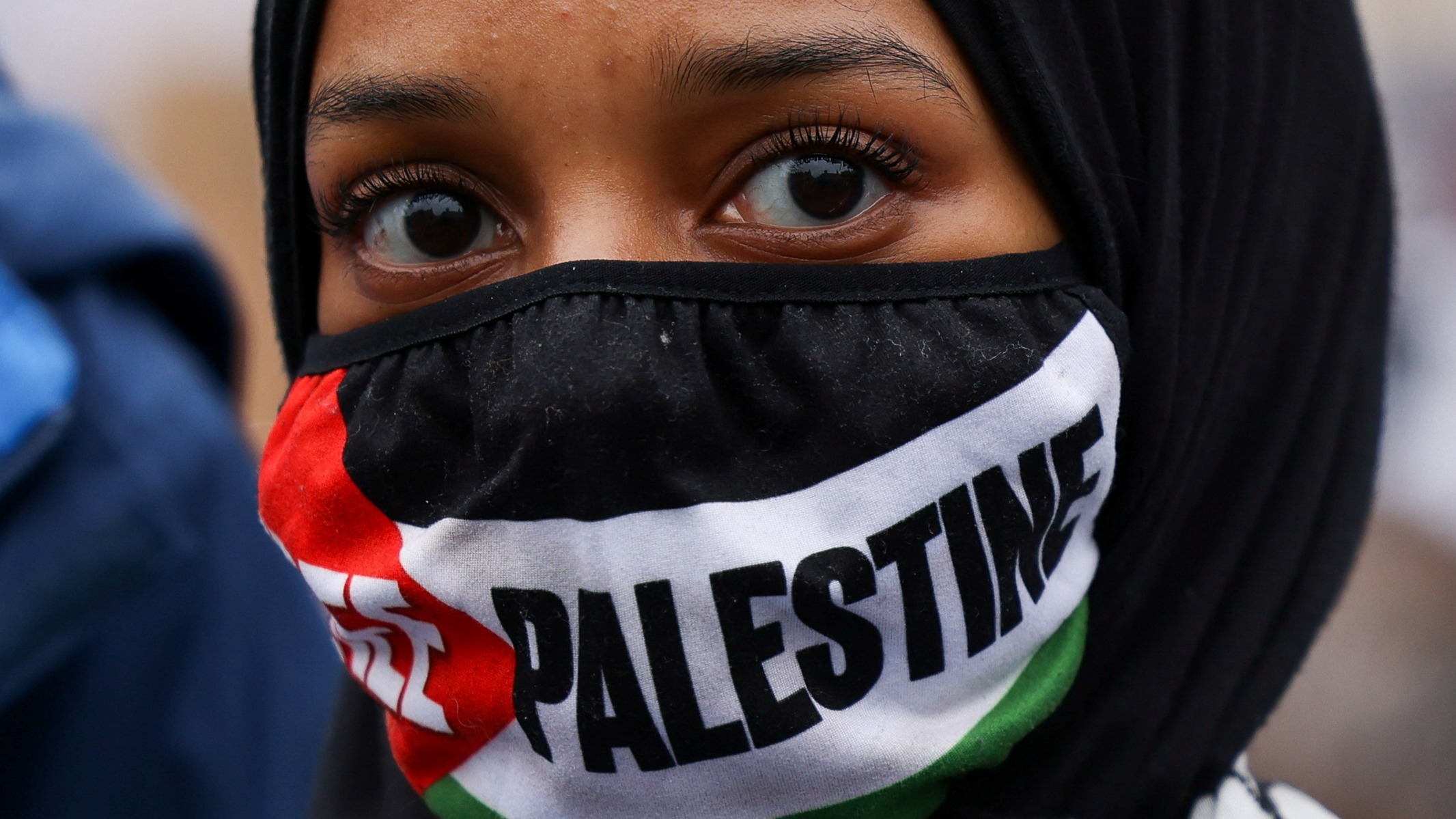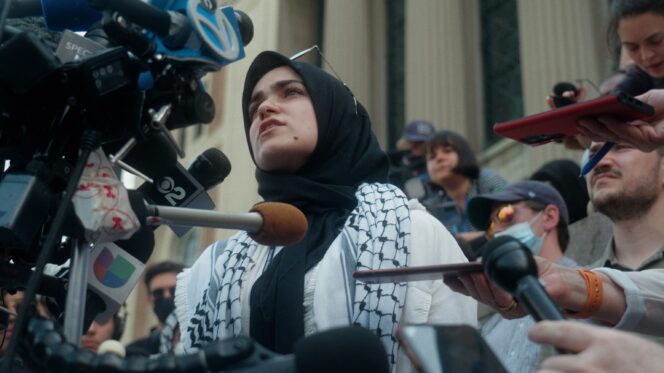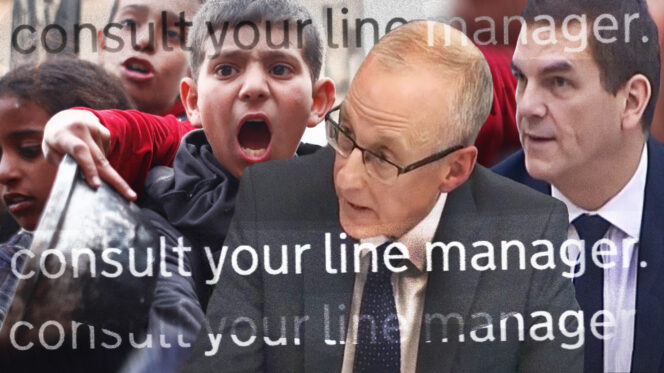
Billionaire-backed? Not us. Unlike mainstream media, Novara Media runs on the support of 12,000 people like you, which keeps us editorially independent. Chip in today and help build people-powered media.
Thanks to an unexpected question from Reform MP Sarah Pochin at Prime Minister’s Questions last week, her subsequent doubling down and Zia Yusuf’s quit-rejoin furore, ‘ban the burqa!’ is once again echoing across the land. Talk shows, newspapers and politicians alike pontificate about what Muslim women like me should and shouldn’t be allowed to do with our bodies – as if that’s the most important issue facing our country.
This is hardly a surprise, though. Lately it feels like we can barely go a few weeks without a new wave of Islamophobia bubbling to the surface of our national political discourse.
Cast a glance back to the last year or so and we’ve seen Palestine protesters labelled terrorists and extremists, Muslim men of Pakistani origin profiled as child groomers, a member of the House of Lords claiming Muslim radicals are seeking to take over Britain through the “power of the womb” and moral panic over a questionable study suggesting that white people would soon become a minority, with Muslims accounting for 1 in 5 Britons by the end of the century. As I write this, rightwing media outlets are descending into a frenzy about blasphemy laws, triggered by the prosecution of Hamit Coskun who burned a Qur’an earlier this year outside the Turkish embassy in London.
And of course that’s before you get to the far-right riots that erupted across the country last summer which saw mosques damaged, Muslim-owned businesses vandalised and attacks on hotels housing asylum seekers. As anyone visibly Muslim navigating life in Britain knows all too well, it is currently the most dangerous time to be a Muslim in British history with Islamophobic assaults rising by 73% in 2024.
As a 30-year-old, the direct aftermath of 9/11 isn’t quite in my conscious memory but I do distinctly remember periods when Islamophobia has felt more palpable and intense – after major terror attacks, post-Brexit and the repercussions of Boris Johnson’s “letterbox” comment, during the height of Isis and the heyday of the EDL and UKIP. But what we are seeing now feels different: a more relentless and systemic dehumanisation than I have witnessed before.
Of course, there’s the fact that our national politics has lurched to the right thanks to the rebirth of Nigel Farage and the soaring popularity of Reform. A likely future prime minister who doesn’t shy away from saying that Muslims are opposed to British values or that migrants should be deported has emboldened those who already held Islamophobic views.
No longer extreme or niche, these opinions are increasingly parroted across the political spectrum as other parties scramble to win back votes from Reform defectors. We can see the impact of this in the way Kemi Badenoch immediately jumped on the anti-burqa bandwagon, suggesting (rather nonsensically) they should be banned in the workplace despite very few Muslim women wearing them in the first place – let alone to the office.
But the dire conditions we have seen for British Muslims of late are not simply random, disconnected instances of moral panic. It’s no coincidence that Islamophobia in the UK has escalated at precisely the same time that Israel’s genocide of the Palestinian people has reached unseen levels of brutality.
As the death toll skyrockets in Gaza and as the tide slowly turns against Israel, anti-Muslim nationalism in Britain has grown exponentially – perhaps by design. It feels like a concerted effort to discredit and disenfranchise British Muslims, to dismiss our values and beliefs as extreme, unpalatable and inherently antithetical to Britishness. And to ultimately derail the Palestinian cause – smearing it as the fringe concern of fanatical extremist Muslims.
It doesn’t matter that Gaza is not a solely Muslim issue or that being incensed that a genocide is happening transcends the boundaries of religious belief. The question of Palestine has long been positioned as one of ‘Muslim versus us’: a crusade to protect the last western outpost in the Middle East. If Israel is that last shining beacon of Judeo-Christian values in the backwards darkness known as the Muslim/Arab world, then to stand against Israel means to stand against the west itself. By extension, to support Palestine means to go against Britishness itself.
We have seen this in the deliberate mischaracterisation of pro-Palestine protests as radical and menacing. A year ago, then-prime minister Rishi Sunak referred to “extremists hijacking democracy”, as though those who support Palestine are outside infiltrators rather than Britons with a functioning moral compass. As home secretary, Suella Braverman referred to rallies as antisemitic “hate marches”. Protests were widely accused of rendering central London a no-go zone for Jews, despite demonstrations boasting attendees of all faiths – including Orthodox Jewish groups.
If British Muslims stand on such precarious grounds that we are once again having to defend our right to exist, then perhaps the powers that be hope we’ll be distracted from what is happening to our counterparts in Gaza. But we cannot separate the massacre of Muslims abroad from the systemic dehumanisation of British Muslims at home. These things are part of the same manufactured effort, functioning to sanction our mass murder overseas whilst painting those who stand against these crimes as the deviants destabilising British democracy instead of the bloodstained perpetrators sitting in the halls of political power.
Nadeine Asbali is a freelance writer and author of Veiled Threat: On Being Visibly Muslim in Britain.


